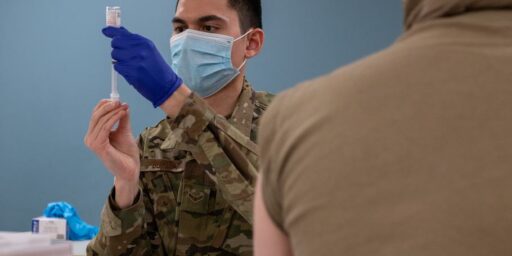OIF Climate Survey
Black Five posts, in its entirety, a climate survey of our forces in Southwest Asia headed up by Charlie Moskos, the preeminent military sociologist of the past several decades. There’s nothing particularly surprising in the results to someone who’s read a number of them, as I have, but the high morale and enthusiasm for the mission–and this is a legitimate, confidential survey where troops were free to speak their minds–will surprise many.
Something I haven’t seen in these surveys before are a couple of questions on attitudes toward Muslims in general and as to whether they would prefer to have Muslim soldiers in their unit. Even factoring in that people tend to give the answers they feel they’re “supposed” to give on questions like that, the overwhelming sense that it was a non-issue is amazing under the circumstances. Indeed, I’d wager markedly less anti-Muslim than a sample of a similar demographic cohort that hasn’t been getting shot at by Muslims for a year.
Also interesting–although really not surprising–are the numbers on whether they’d have volunteered for the mission if they’d have had a choice. About half would have and half wouldn’t have. These numbers are fairly comparable to other post-Gulf War missions except Bosnia (1998) and Kosovo (2000), where the enthusiasm was, contrary to what I’d have expected, much higher.
From a glance–I haven’t done any formal analysis of the data–it looks like there’s more response variation between the Reserves and National Guard than between the Reserves and Active Component. I don’t know enough about the Guard/Reserve breakdown to have a theory on that one.
This one is worth noting, though: “8. What effect do you think this mission will have on your decision to reenlist/remain in the service?” Answering “It will make me less likely to reenlist/remain” were 49% AC, 63% USAR, 67% ARNG. I’m not sure how these numbers compare to similar questions asked during other operations. Compared to the actual behavior of soldiers after recent conflicts (Desert Storm onward), though, these numbers are frighteningly high.





Interesting survey. Not exactly what you would expect. One thing to remember is that this was taken while in Iraq. Re-enlistments happen at various times: the one big advantage of re-enlisting in Iraq is that any bonus is completly tax free. I am not quite sure about how that would affect reservists.
One other little tidbit is that the Army is trying to restructure and keep soliders at units longer. The old standard was about 3 years before changing posts; the new one is going to be 6 years to CONUS locations. I am not sure how that would affect such things as recruiter duty and joint duty but 6 years in one post would be a little too long for my taste. I could survive 6 years in Fort Carson, CO but Fort Polk, LA would be torture and would certainly affect my potential for re-enlisting.
Re-enlisting is a personal decision that is affected by many things beyond a tour in Iraq. Family, friends, duty and lifestyle are all combined. One thing that has not been addressed is the improving economy: the prospect of a good job outside (even as a contractor to Iraq) could tip people not to re-enlist.
—